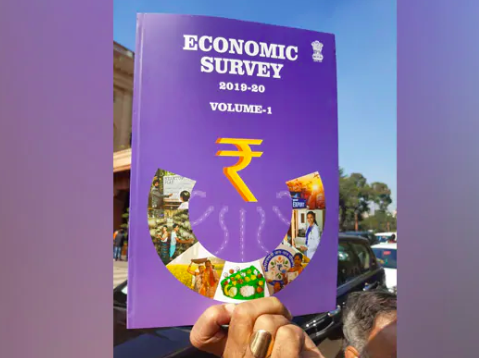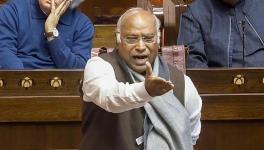Economic Survey: Ten New/Old Lies and One Message

The Economic Survey for 2019-20 (the financial year that is ending), authored by Chief Economic Adviser (CEA) Krishnamurthy Subramanian, was tabled in Parliament today. It is a voluminous compilation of how the economy fared in the year. But more than that, it has steadily acquired the status of a wish list, a smorgasbord of fantastic ideas of whoever is the incumbent Economic Adviser. The government, sensitive to public opinion, may or may not follow the Survey’s thoughts. That’s been the general record of late.
But this time, the Survey captures the government’s mood and inclination – indeed its very soul – quite admirably. As announced by the CEA in his press conference in the afternoon, the theme of the Survey was "Wealth Creation". With this, he solidly aligned himself with the Prime Minister who has been stressing that industrialists and business tycoons are the wealth creators of the country and they need to be supported. The Survey proudly declares that there are two pillars of wealth creation: the invisible hand of the market and the hand of trust (which refers to trusting big companies and they in turn trusting the government).
In short, the Survey is a sort of manifesto for making India a completely market-driven society to ensure that big business gets a free hand to create wealth. Will this wealth get distributed to people? The Survey says, first wealth has to be created, only then the issue of distribution will come!
Slowdown
The Survey then proceeds to flag that indeed economic growth slowed down to just 5% in the year (2019-20), explaining that this was caused by a host of factors, such as sluggish household spending, embattled non-banking finance companies (NBFCs), a wobbly world economy and lower tax revenue collections. Of these, the last is not a cause but an effect, as any college economist would know.
As far as the wobbly world economy is concerned, yes it does have an effect, but then India was growing earlier even in a wobbly world. The crisis in the financial sector, caused by the shadow banking system and growing bad loans, may be causes but surely the government itself was responsible for it?
The first factor is indeed correct – household consumption is dipping, indicating deep economic distress, forcing households to cut their expenditure. Leaving aside the fact that this dip started in 2017-18, as per the latest National Statistical Office report to be suppressed (but leaked), and so the problem started earlier even when growth was fine, the key question that the CEA fails to ask and answer is – why?
Households do not have money to spend because incomes are low, real incomes (adjusted to price rise) are dipping or stagnant among most of working people, jobs have become precarious and joblessness has reached epic proportions. All these are known facts and well documented. The Survey singularly fails to analyse any of this. This is par for the course as far as Economic Surveys are concerned. But India is passing through a grave economic crisis – and the mandarins of Finance Ministry have nothing to address this, the distress and pain of the people?
The Solution
The Survey spends most of its attention on what it wants India to do and become in the future. After ticking all the usual boxes, like quoting from ancient texts (Arthashastra and Thiruvalluvar’s Thirukural) and then, quellle surprise, from Adam Smith, the Survey lays down a cliched feast of ideas that have been discredited by recent history.
These 10 ideas for a ‘New India’ are: wealth creation which benefits all; markets enable wealth creation; trust is a public good; grassroots entrepreneurs create wealth in their own districts; pro-business policies give equal opportunity; remove anachronistic govt. intervention; job creation by “Assemble in India for the world”; improve ease of doing business; fin-tech for banking sector; and “Thalinomics”.
Of these some are just jumlas or empty rhetoric. Entrepreneurs create wealth in their own district – yes, but so what? How will entrepreneurs arise and whom will they sell their goods or services to? No answer.
‘Thalinomics’ is a rather pathetic attempt to include behavioural economics in name, but actually it’s a dodgy set of arguments and data to show that prices of food have gone down – except that they have risen again this year!
But the meat of the 10 pillars is a serious declaration of war on the people of the country. It is an exhortation to remove government interventions in the economy so that wealth creation can take place by corporate houses. That means, reduce subsidies, remove laws that cause any government regulation in, say, price control, imports, natural resource use, labour relations – everything.
In the name of job creation, the only thing that strikes the wise men is “adopting” the Chinese model (as seen by the ruling Bharatiya Janata Party) of becoming the world’s assembly line. Import the components, assemble these and send out. There is a mere nod to the failed ‘Make in India’ by saying that this new idea will be merged with the latter. To think that anybody will choose India for assembling goods, apart from the mobile phone makers and a few auto makers, is a pie in the sky. And, especially not in the current “wobbly world”. And, to think that this would help Indians find jobs is entering cuckoo land. A few lakh jobs, if everything falls into place – that’s all. When over seven crore people are unemployed and at least 60-70 lakh are being added to job- seekers ranks every month, this is a tragically bankrupt idea.
So, what’s the bottom line? The Economic Survey shows what the government is thinking, even though all its wishes may not be taken up finally. The thinking, however, is more of the same that the Narendra Modi government has been doing till now, like cutting corporate tax, destroying protective labour laws, opening up foreign investment in key sectors, selling off public sector enterprises for virtually nothing, etc. It has not helped the economy recover because the basic causes – low incomes, raging unemployment deteriorating education and healthcare services and rising prices – are ignored. The Union Budget will probably be on similar lines, of course, with some sugar coating.
Get the latest reports & analysis with people's perspective on Protests, movements & deep analytical videos, discussions of the current affairs in your Telegram app. Subscribe to NewsClick's Telegram channel & get Real-Time updates on stories, as they get published on our website.
























